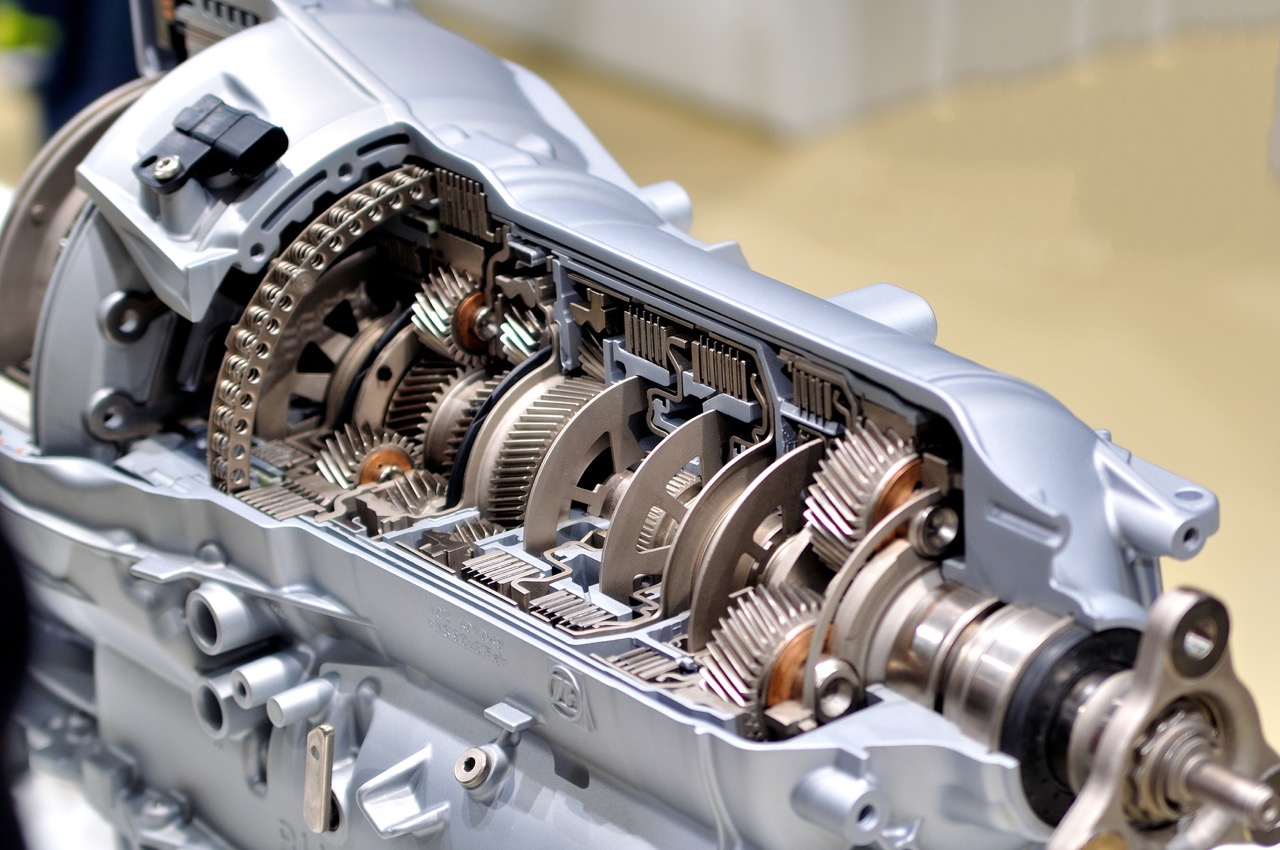
What Is Your Vehicle’s Transmission?
At the front of your vehicle, mounted to the chassis, is your Transmission. The transmission, in short, is what determines how much power goes to your wheels at a given speed.
How Does It Work?
Not unlike the gears on your bicycle, your transmission works by shifting through different gears depending on speed. The exact process of how this is done depends on your type of motor, manual or automatic.
Manual
A manual transmission is one that requires the operator to manually shift up or down through the gears using a clutch and gear shifter.
- The clutch is engaged, temporarily disconnecting the transmission from the engine
- The gear shifter is moved to the desired gear
- The clutch is released, reconnecting the transmission to the engine
- Your vehicle is now operating in the desired gear
Automatic
An automatic transmission does the same job but, well, automatically. The operator is not required to take any action. Rather than a clutch and gear shifter, a torque converter is used to connect the transmission to the engine. The torque converter senses changes in speed and uses pressure to automatically shift to the proper gear when accelerating or slowing down.
Your transmission is crucial for your engine to function properly, without it your engine would overheat or shake itself apart. Replacing your transmission is costly, on average you could spend anywhere from $2000 – $3000. Even upwards of $10,000 on luxury cars.
Signs of A Failing Transmission
Low Levels and Leaking Fluid
Low transmission fluid levels indicate that your fluid is leaking, potentially through a gasket, hose, or seal. Without adequate transmission fluid, your transmission will fail to function properly and could overheat.
- Check the ground under your vehicle for a reddish, sweet-smelling fluid
- Older, used-up fluid could be darker and smell more “burned”
- If your vehicle has a transmission fluid dipstick, go for a short drive then check its levels
- You may be required to take your car to a professional as special tools are sometimes needed for specific vehicles
Strange Smells
A burning smell could mean that your transmission fluid is old and degraded, this causes overheating and the burnoff of fluid. Overheating can cause transmission and engine failure as well as lead to early wear and tear and corrosion.
Other potential causes of strange smells could be;
- Plastic bits trapped inside the engine
- Fluid leaking onto heated surfaces
- Melting components
Be sure to get any weird smells checked out as soon as they occur before leading to irreversible damage.
Unusual Sounds and Noisiness
Whining, humming, clunking and buzzing sounds or overall noisiness while operating your vehicle could all be potential signs of;
- A bad bearing
- A broken seal
- Low transmission fluid
- Gear damage
- A clogged pump or filter
Any one of these, or the many other potential problems, could prove catastrophic for your transmission. As with all signs of transmission failure, pay close attention and do not disregard these warnings.
Gears Slipping
When you are shifting through gears it should be smooth and seamless, if your vehicle fails to shift properly or to stay in gear chances are you are experiencing slipped gears. This can not only lead to extensive damage but can also create a potential safety hazard for you and your fellow motorists. Potential causes may include;
- Normal wear and tear over time
- Low transmission fluid
- A faulty torque converter
- Contamination or water intrusion from wet conditions
- Worn out gears and plates
Whatever the cause, if you are experiencing higher RPMs, failure to shift, a delay in acceleration, weird smells, or your dashboard warning light comes on, you may be experiencing slipped gears. Some have likened it to the sensation of driving over ice with no traction.
Shakiness or Grinding
As previously stated, shifting while driving should be smooth and relatively unnoticed. More common in automatic transmissions, shaking or vibrating may be an indicator that your transmission is starting to fail.
In manual transmissions, you are more likely to experience grinding. This could be due to;
- A worn-out clutch
- Bad gear synchronizer
- Old, damaged gears
Whatever your transmission type and whatever the cause, it is always best to get this looked at by a professional before the problem worsens.
Dragging Clutch
Only a problem for manual vehicles, clutch drag is when your clutch pedal fails to disengage the clutch disk from the flywheel. This causes gears to grind together when shifting, or stops the ability to shift altogether.
Know The Solution!
Vehicles are an assemblage of complex parts, just like in a watch. Failure in even the tiniest mechanism could lead to ruinous results. Take special care to educate and inform yourself to know the signs of transmission failure and what to do when they take place.
Related Posts
Key Takeaways On average, passenger vehicle tires last 40,000 to 60,000 miles, depending on type, driving habits, and maintenance. Replace tires when tread depth reaches 2/32”, if damaged, or older than 10 years. Regular rotation, alignment, and proper inflation extend tire life. Aggressive driving, poor roads, and harsh weather shorten tire lifespan. Take advantage [...]
When you think about car maintenance, you probably focus on oil changes, tire rotations, and maybe even brake pad replacement. But what about your brake fluid? If you’ve ever wondered, “What does brake fluid do?” or “Why is brake fluid important?”, you’re not alone. Brake fluid might not be the most talked-about part of [...]
Is that high-pitched squeal from your brakes driving you—and everyone else—crazy? Don’t ignore it. Squeaky brakes aren’t just annoying, they’re your car’s way of saying something needs attention. Whether you're cruising through Salt Lake City or winding up Idaho’s mountain passes, here’s what’s likely going on, how you can fix it, and when it [...]





